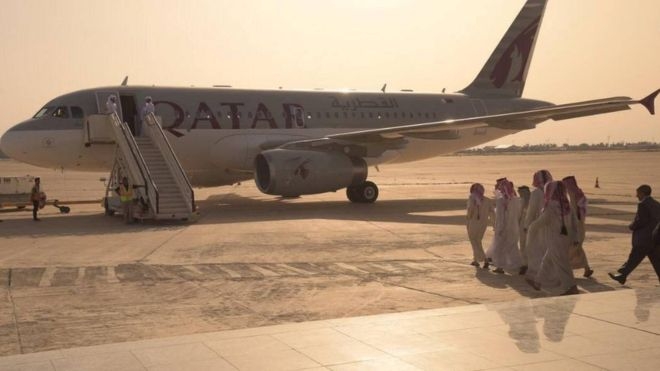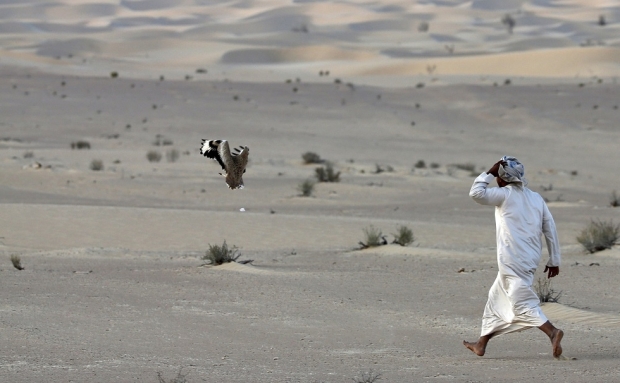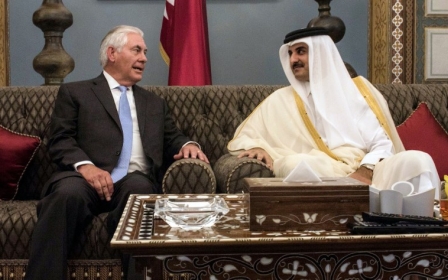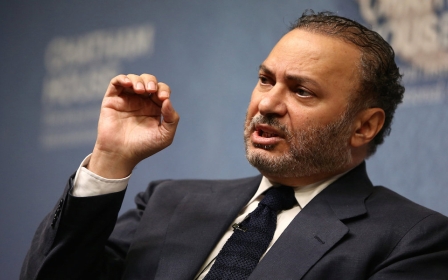US officials dismiss claims Qatar gave $1bn ransom to al-Qaeda

US officials say reports that Qatar paid a $1bn ransom to Iranian and al-Qaeda militants for the release of a royal hunting party are false and were planted by UAE officials, NBC News has reported.
The two-month Gulf crisis between Qatar and other Gulf states, led by Saudi Arabia and UAE, was triggered after reports that the Qatari emir had praised militant group Hamas and that the country had paid around one billion dollars in ransom to al-Qaeda for the release of a Qatari hunting party.
The "fake news", which appeared on the state news agency on 24 May, was designed to harm Qatar's relations with the US and played a major role in the diplomatic split between the tiny Gulf nation and its neighbours, US officials and the Qatari government told the US broadcaster.
In late May, as the Gulf crisis escalated after initial "false news" stories, there were reports that the Qatari government had paid a ransom of up to $1bn to al-Qaeda and Iranian-linked militants to secure the release of a group of royals who had been kidnapped on a hunting trip to southern Iraq in late 2015.
The story spreads
The purported ransom, which was allegedly paid in April this year, was seen by some in the region as evidence of Qatari support for terrorism. Local media quoted "militant groups" and "government officials in the region" as sources for the ransom tale, and several major international media outlets, including the Mail Online website, quickly picked up the story.
However, according to US intelligence officials quoted by NBC News, the story is false. "Hardly anything about the Qatari [ransom] story in the news media is correct," said one official.
Two other officials told NBC News that they would "steer" the broadcaster away from the claim that al-Qaeda received funds in the swap. Instead, the officials said the ransom payment was made to the Iraqi government, which had negotiated the release of the 26 captives.
The Iraqis then kept the money instead of giving it to the kidnappers, according to one of the officials.
The ill-fated hunting trip took place in December 2015 when the group of Qatari falconry enthusiasts was captured in southern Iraq and held hostage by an Iranian-backed Shia militia for 16 months.
In the wake of the kidnapping, it was reported that Doha paid off blacklisted Iranian security officials and Shia militias, as well as a militant group in Syria accused of being an al-Qaeda affiliate. Reports also suggested that the group contained nine members of the al-Thani ruling family and that the trip had been carefully co-ordinated with Iraq’s interior ministry, which is widely reported to be infiltrated by pro-Iran operatives.
Hardly anything about the Qatari [ransom] story in the news media is correct
- US intelligence source
As the kidnapping began, the group’s Iraqi guards disappeared and helicopters landed nearby, suggesting, according to media reports, some Iranian or Iraqi complicity in the plot. According to one account, the hostages were then held underground in Baghdad’s green zone, where most foreign diplomats are based.
However, NBC News reported that one US intelligence officer said that only one hunter was a royal and described him as a "minor prince". It said the group was "sold" on to a Shia group in Iraq's Muthanna Province, northwest of Kuwait, where they were held.
According to the latest report, the Qatari government approached the Iraqi government and negotiations began. The Iraqi government, according to one of the three officials quoted by NBC News, passed an initial ransom offer to the Qataris, who rejected it in the spring of 2016.
A second round of negotiating was successful and on 15 April, a chartered Qatari Airlines plane landed at Baghdad International Airport. It was carrying around $330m and six days later, the hostages were released and flown back to Qatar.
According to US officials, the Qatari government never spoke to the kidnappers and the $330m was "confiscated" by Iraqi security forces and never made its way to the kidnappers.
This appears to confirm comments made by the Iraqi Prime Minister Haider al-Abadi last month when he told state TV that the ransom payment was still deposited in the central bank in Baghdad, pending a decision on what to do with it.
He said: "Not one dollar, or euro spent; they are still in their crates, supervised by a committee, and two representatives of the Qatari government came to check when they were deposited under the trusteeship of the central bank."
A wider plot to discredit Qatar?
NBC News reported that none of the three officials quoted in the story claimed that the fake ransom story was released by the UAE, or any of the other countries blockading Qatar, but said that it did not reject suggestions it could be part of a wider effort to discredit Qatar.
In a statement released to Al Jazeera following the release, Qatari officials denied any money was ever intended for terrorists. They said: "Qatar said the money 'was to support the authorities' in Iraq for the release of 'abductees'.
"Qatar has provided funds to Iraq in an official, clear and public manner. Qatar did not deal with armed groups outside the authority of the Iraqi state," the statement continued.
The report's false claims over the Qatari ransom payment followed a report in the Washington Post earlier this week that claimed Qatari news sites and social media were hacked on 24 May in order to plant false comments attributed to Emir Sheikh Tamim Bin Hamad al-Thani.
The Post reported that the US had overheard UAE officials discussing the plan on 23 May. The next day, the Qatari emir's purported remarks spread via social media, leading the UAE and five of its neighbours to break relations with Qatar, and then block air, truck and ship traffic to the country.
In a statement to NBC News, Qatari officials said the logs of traffic to the Qatari News Agency's website "show a spike in visits from the UAE during the hour before the hacking incident occurred, which suggests that people in the UAE were clearly anticipating the appearance of the hacked material. Once the fabricated quotes appeared, they immediately became big news in the UAE and Saudi Arabia."
'The UAE played no role'
The Qatari authorities also accused the governments of Saudi Arabia and the UAE of ignoring "this clarification and have continued to report 'fake news' about the hostages' release. And regrettably, some legitimate, mainstream news organisations have continued to do the same."
The statement also said that Qatar had been the victim of a "well-coordinated smear campaign designed to damage the image and reputation of Qatar. And the smear campaign, in turn, set the stage for the blockade and the ultimatum that followed in June."
The UAE embassy in Washington has denied the allegations in a statement posted on its website. "The Post story is false," said the statement. "The UAE had no role whatsoever in the alleged hacking described in the article."
"What is true is Qatar's behavior. Funding, supporting, and enabling extremists from the Taliban to Hamas and Gaddafi, inciting violence, encouraging radicalisation, and undermining the stability of its neighbours."
New MEE newsletter: Jerusalem Dispatch
Sign up to get the latest insights and analysis on Israel-Palestine, alongside Turkey Unpacked and other MEE newsletters
Middle East Eye delivers independent and unrivalled coverage and analysis of the Middle East, North Africa and beyond. To learn more about republishing this content and the associated fees, please fill out this form. More about MEE can be found here.




